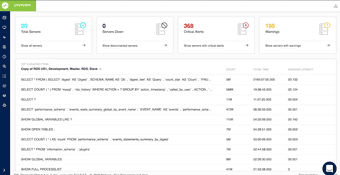Video : SQL Diagnostic Manager for MySQL
Monitor How Well MySQL and MariaDB Perform
It is important to monitor how well MySQL performs. Monitoring MySQL performance helps you:
- Identify bottlenecks: Monitoring performance metrics can help you identify slow queries, inefficient indexing, and other issues that may cause performance degradation.
- Optimize performance: By identifying bottlenecks and problem areas, you can take actions to optimize how well your MySQL database performs, such as tuning query performance, optimizing indexes, and adjusting configuration settings.
- Ensure high availability: Monitoring MySQL performance can help you detect potential issues before they become critical, allowing you to take proactive measures to ensure high availability and prevent downtime.
- Capacity planning: By tracking performance trends over time, you can better plan for future capacity needs and make informed decisions about scaling your infrastructure.
- Improve user experience: A well-performing MySQL database can lead to a better user experience for applications that rely on it, as queries will be executed faster and the overall responsiveness of the application will be improved.
Some of the key performance metrics for MySQL include:
- Query throughput: The number of queries executed per second, which can help determine the overall workload on the database.
- Query execution performance: The time taken to execute queries, which can help identify slow queries and optimize them.
- Connections: The number of active connections to the database, which can affect performance if there are too many concurrent connections.
- Buffer pool usage: The usage of the buffer pool, which is a memory area that caches table and index data to improve query performance.
Watch this video to learn how to monitor how well MySQL databases perform with SQL Diagnostic Manager for MySQL.
Topics : Database Diagnostics,Database Monitoring,Database Performance,SQL Query Performance,
Products : SQL Diagnostic Manager for MySQL,

